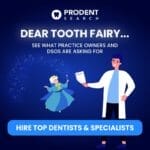Last updated on June 15th, 2022
Corporate dentistry has generated a lot of criticism, but there are some clear benefits to individual dentists and to the dental industry.
The increase in the number of Dental Service Organizations (DSOs) and in the number of dentists who work for them has caused some controversy. The decline in individual practices (which is driven by group practices as well as DSOs) seems to generate most of that controversy.
First, what is a DSO? A DSO is not a group practice, in which a group of dental partners share in the expenses and profits of operating one or more office locations. It is a separate corporate entity, often owned by a private investment group, that contracts with dental practices to provide all non-clinical operations. This can include not only accounting, billing, human relations and IT support, but also compliance, marketing and buying or leasing pricey equipment. In short, the dentists do the dentistry and the bean counters count the beans.
It’s a model that is growing in favor. There are now more than 4,000 dental offices affiliated with DSOs. An ADA Health Policy Institute study in 2019 found that 7.4% of dentists worked for DSOs. The eye opener is that the number for over-65 dentists is just 4% (not surprising) while for those under 34, it’s over 20%. Younger dentists with high levels of dental school debt may find it difficult to gather the capital needed to open a solo practice. A DSO is an easy way to enter the profession without going even further into debt.
Efficiency is part of the reason, too. A large DSO can operate 100 dental offices more cheaply than 100 private practitioners can. They can spread the cost of things like software and HR executives over 100 offices instead of one. They can get better pricing from suppliers.
Most criticism of DSOs involves corporatizing dental care decisions, driving down the cost of dental care below what private offices need to prosper and that they limit growth opportunities by channeling professionals away from the traditional path of starting solo then growing a larger practice by hiring associates.
The fairness and accuracy of those criticisms is the subject of debate, but there are some ways that DSOs are directly benefitting the dental profession that most observers agree on:
1. DSOs Attract Capital
Private equity groups are the biggest funders of DSOs. This means outside capital is flowing into dentistry. That capital purchases the latest equipment, making it available for use on more patients. The capital helps reduce dental school debt for associates. And it pays for marketing campaigns that promote dental health.
2. Easier Entries and Exits
For the young dental school graduate, launching a solo practice is daunting. Not only is there the issue of finding the money, but few recent graduates have the business skills to launch and sustain a solo practice. The hours of drilling and filling can be followed by hours of posting and debiting, arguing with insurance companies and scouring the community for hygienists. There’s none of that with a DSO. Walk in, put on a lab coat and start treating patients. At quitting time, you take off the lab coat and actually stop working. Some DSOs will help pay off school debt, offer CLE and even transfers between locations.
For established solo practitioners or group practices, DSOs can be a ready made market for their assets. The traditional route of finding a younger associate with the means, the capacity, the business skills and the desire to purchase a solo practice is becoming more difficult. Once a candidate is found, will the owner have to take some of their buyout in timed payments? Do you trust the buyer to successfully operate the practice long enough to pay you off? That makes corporate buyers with deep pockets and a successful business model very attractive.
3. Spurring Innovation
One criticism of DSOs is that, by encouraging standardized treatment plans, they discourage innovation. But the opposite may actually be more common, that new treatment modalities pioneered in one office can be quickly replicated across a DSO’s entire network.
Also, the role of money in encouraging development of advanced treatment hardware should not be underestimated. DSOs have the ready cash and the motivation to purchase the newest and most advanced equipment. They have multiple facilities to put it in, they can create a corporate training program for practitioners and roll out a multi-city marketing campaign to educate the public on its benefits. The existence of a proven, motivated and cash-rich market is a powerful incentive for both researchers and equipment manufacturers to innovate.
4. Making Dental Care More Affordable
The criticism that DSOs drive prices of care lower is accurate — which is a benefit to patients, especially to lower-income patients who may not have dental insurance coverage. Also, the ability to operate with lower overhead means DSOs may locate offices in lower-income areas that are avoided by solo and group practices looking to pull the most they can out of the market. If you have just one office, you will look for the sweet spot between too much competition and too little prosperity. If you have dozens of offices, “soaking up” some unused care dollars from disadvantaged areas that are not currently being served is a viable strategy.
5. Marketing
The value of DSOs being able to amortize the cost of marketing materials across dozens or scores of offices can’t be overstated, even for solo or group practices in their market areas. This is what marketing practitioners call “leakage.” One company (say an auto maker) advertises widely and creates a demand for a new product or feature (like electric cars) and it benefits all the sellers of electric cars by increasing awareness of the benefits and motivating potential buyers. The same is true for dental advertising: As DSOs motivate the public to seek dental care, not everyone they motivate is going to use that specific DSO’s services. Maybe the office isn’t close by, maybe a friend has a solo/group practice that also performs those services and recommends them when it comes up in conversation, maybe the patient just prefers a small-office environment. Whatever the reason, more marketing by DSOs means more business, some of which will flow outside of their system.
As Shakespeare noted, it is an ill wind indeed that blows no man good. Even the harshest critics of DSOs are beginning to see the benefits of DSOs to both dental professionals and to the dental profession as a whole.
Please take the time to read our other insights!

- The 5 Phases of The Dental Career Path - January 4, 2024
- 7 of the Highest-Paid Dental Specialties in 2024 - December 22, 2023
- How to Reduce Dental Fears: 7 Ways to Increase Patient Comfort, Attendance, and Retention - December 15, 2023
Looking To Hire Top Dental Talent?
Dentists, Find Your Next Dream Job Here.



